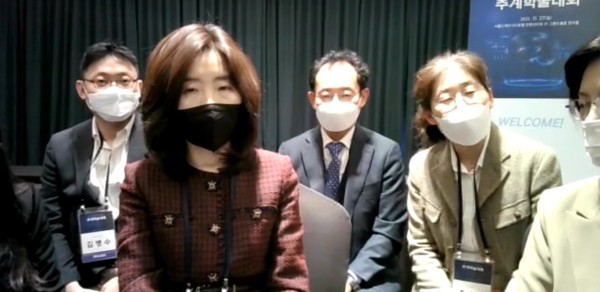CGRP (calcitonin gene-related peptide) inhibitors, developed to prevent adult migraines, have recently been registered on the list of insurance beneficiaries, but their reimbursement standards are unrealistic, experts said.
“The reimbursement criteria for CGRP inhibitors have been set by Western standards and are too unrealistic to be applied to Korean patients,” said Kim Byeong-su, a director at the Korea Headache Society (KHS) and a neurologist at Bundang Jesaeng General Hospital, Sunday. “The government should try to relax the criteria to suit Korean conditions better.”

There are two CGRP inhibitors introduced in Korea – Lily’s Emgality (galcanezumab) and Teva Handok’s Ajovy (fremanezumab). Emgality has received insurance benefits since Sept. 1 as a preventive drug for chronic adult migraine patients.
However, their detailed reimbursement criteria are very strict, causing complaints in the medical field.
More specifically, insurance benefits are given only to patients who meet all the three following criteria:
• Show treatment failures in three or more migraine preventive drugs, such as topiramate, divalproex, amitriptyline, flunarizine, and beta-blockers, such as propranolol or nadolol).
• Have migraine for at least one year or more, suffer from migraine for 15 days or more a month in the last six months before administration, and have migraine for eight days or more a month.
• Record 21 points or more in the migraine disability assessment test (MIDAS) and 60 points or more in the headache influence test (HIT).
According to Kim, among the three detailed criteria, the most difficult to meet is experiencing treatment failures in three or more migraine preventive drugs. “To increase the use of existing preventive drugs to the maximum tolerable level to use CGRP itself can be harmful to patients,” he said. “Even the maximum usable limits were set by Western standards, and applying them to Korean patients is unreasonable.”
Kim noted that pharma companies had lowered prices by 40-50 percent from their initial launching to reduce patient burdens, saying that urgent patients could consider using them without insurance benefits.
Ajovy, the other CGRP inhibitor available in Korea, also prepares to receive insurance benefits. However, if the current reimbursement standards are fixed, Ajovy’s reimbursement standards will also be beyond the reach of many patients, according to KHS.
“Some patients might feel satisfied with the development of drugs to prevent migraine. However, their reimbursement standards fell short of most patients’ expectations,” said KHS Chair Cho Su-jin, a neurologist at Hallym University Dongtan Sacred Heart Hospital. “Registration on the list of insurance beneficiaries is not the end of the process but marks another beginning (for reevaluation).”
Asked to compare differences between Emgality and Ajovy, Cho said, “We are still short of real-world data. So, let’s wait and see a little more.”
KHS Vice-Chair Ju Min-kyeong, a neurologist at Severance Hospital, said, “Even if we do not have one of the two, we have at least an alternative. Korean patients have only two options now, but I hope they have more. If there is any difference between the two, fremanejumab is a three-month therapy, offering patients to choose between two according to their preference.”
In the autumnal academic conference, experts delivered lectures on various issues, aside from CGRP inhibitors’ latest advances and lowering drug costs and changes in treatment thanks to their reimbursement. Among other topics were intractable chronic migraines and migraine or persistent headaches after the Covid-19 infection.
Professor Henrik Winther Schytz, who heads the International Headache Society, also delivered a lecture on neck pain and headache under the title “A critical approach to cervical headaches.”

